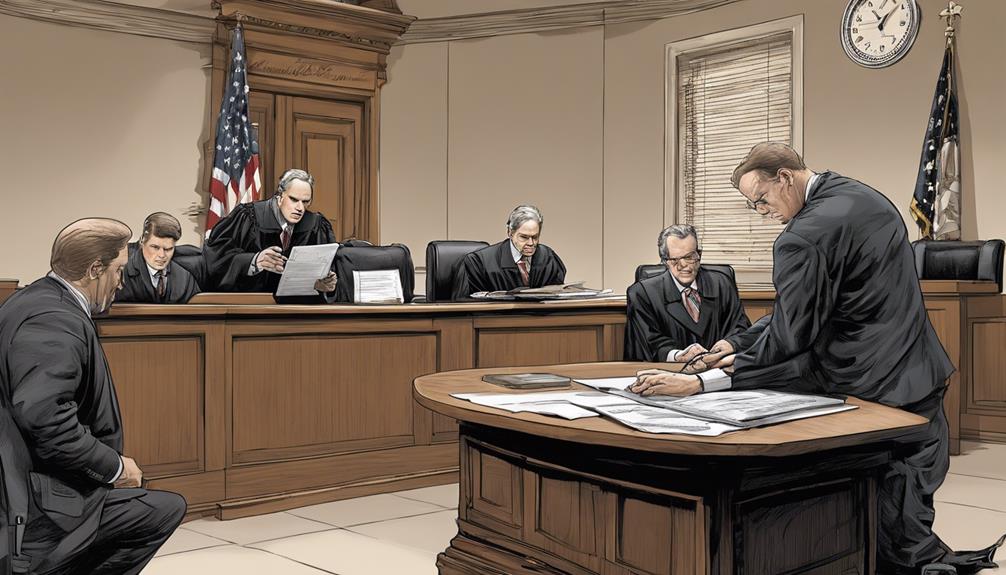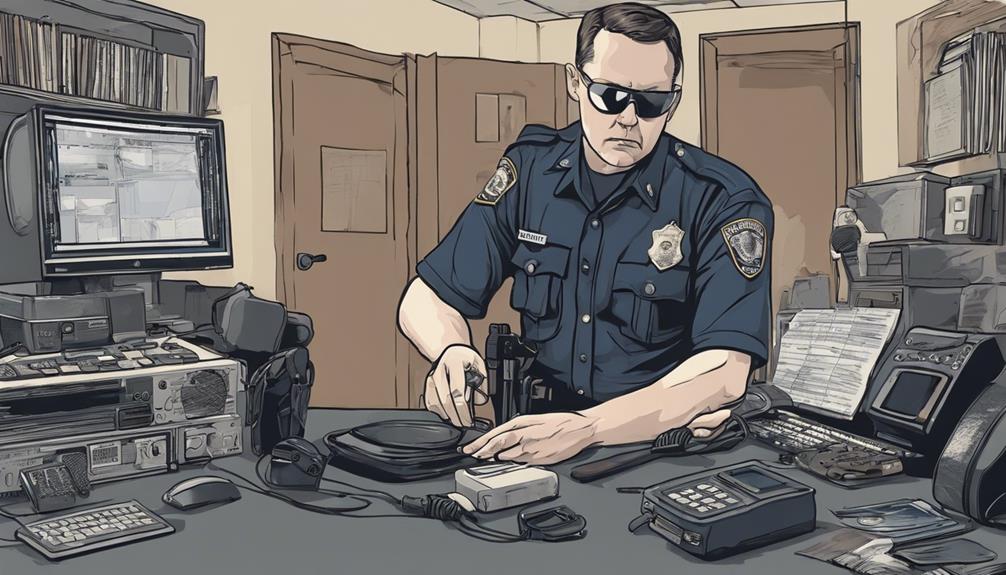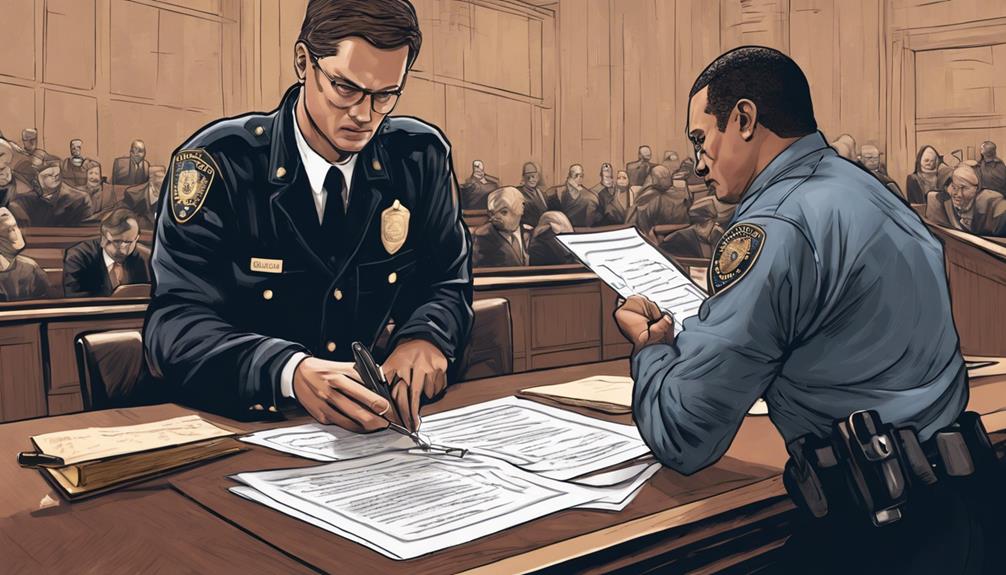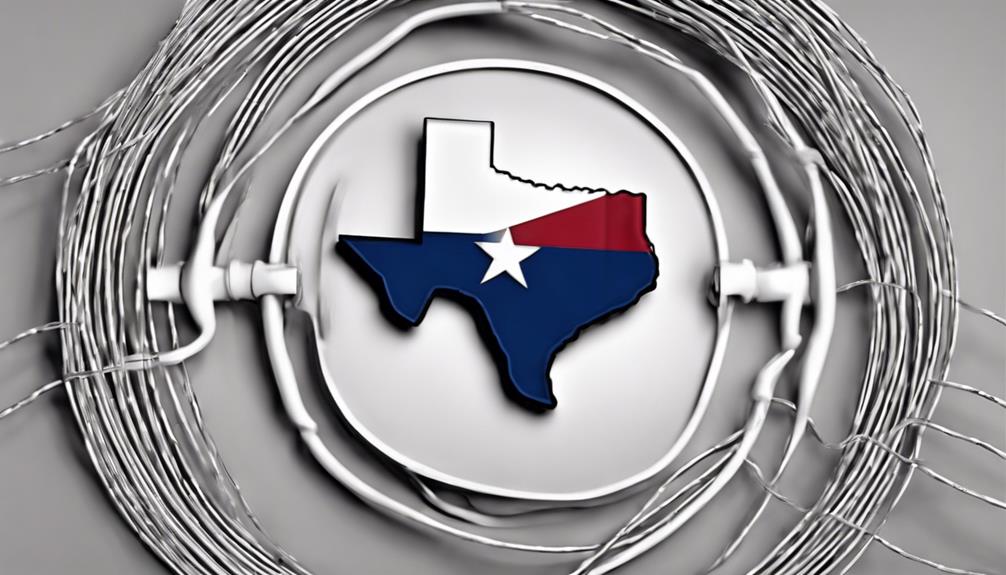Texas wiretapping law permits recording conversations with the consent of one party. Unauthorized interception is against the law and may result in criminal charges. Warrants are necessary for legal interception, ensuring proper supervision. Understanding the one-party consent rule is crucial to avoid legal issues. Detailed guidelines govern wiretapping procedures, emphasizing the balance between law enforcement and privacy. Court approval based on probable cause is required for authorization to wiretap. Breaking wiretapping laws can result in criminal prosecution and civil lawsuits, with harsh penalties. Familiarizing oneself with these important points is crucial for a thorough understanding of Texas wiretapping regulations.
Key Takeaways
- Texas permits recording conversations with consent of at least one party.
- Wiretapping warrants ensure legal interception of communications.
- Texas follows the one-party consent rule for recording.
- Protocols and procedures must be followed for wiretapping.
- Enforcement and penalties exist for wiretapping violations.
Texas Wiretapping Regulations
Texas wiretapping regulations permit the recording of conversations with the consent of at least one party. This means that in Texas, it's legal for an individual to record a conversation as long as they're participating in that conversation and give their consent.
However, unauthorized interception or recording of communication is considered an illegal offense. It's important to understand that these wiretapping laws apply to various forms of communication, including wire, oral, and electronic communications. Violating these laws in Texas can have serious consequences, leading to criminal charges and even civil lawsuits.
Hence, individuals must be aware of and comply with the regulations to avoid legal trouble. By knowing the rules around wiretapping in Texas, people can make sure they aren't inadvertently breaking the law and protect themselves from potential legal repercussions.
Necessity of Wiretapping Warrants

Why is obtaining wiretapping warrants essential for surveillance of communications in Texas? Wiretapping warrants play a critical role in ensuring that the interception of calls, texts, or emails is conducted legally and ethically. Here are three key reasons why these warrants are necessary for conducting surveillance in Texas:
- Legal Compliance: Wiretapping warrants are specific legal authorizations required to intercept and monitor communications. Without these warrants, any intercepted communication would be considered unlawful and inadmissible as evidence.
- Official Approval: Approval from designated officials, such as judges, is essential for obtaining wiretapping warrants. This oversight helps guarantee that surveillance activities are justified and adhere to the law.
- Detailed Requirements: Wiretapping warrants must contain detailed information about the target of surveillance and the purpose of monitoring. This level of detail is necessary to prevent unjustified or overly intrusive surveillance practices and to protect individuals' privacy rights.
One-Party Consent Rule in Texas

In Texas, the one-party consent rule allows recording if at least one person involved agrees to it. This means that as long as one party consents to the recording, it's legal under Texas law.
Understanding this rule is important for knowing when it's permissible to record conversations in the state.
One-Party Consent Requirement
Understanding the requirement for one-party consent is essential for legally recording conversations in Texas.
- One-Party Consent Rule: Texas law allows one party involved in a conversation to consent to its recording.
- Permission: If you're part of the conversation, you can record it with your own consent.
- No Need for All-Party Consent: Unlike some states, Texas doesn't require consent from all parties for recording conversations.
Legal Recording Permissions
Legal recording permissions in Texas operate under the one-party consent rule, allowing individuals to record conversations if at least one party consents. This rule permits you to legally record a conversation in Texas as long as you're one of the parties involved.
Understanding this rule is essential to prevent potential legal repercussions when recording conversations. In Texas, having consent from just one party is adequate to comply with wiretapping laws. Failure to abide by the one-party consent rule can result in facing criminal charges and civil lawsuits.
Hence, it's important to be aware of and adhere to Texas wiretapping laws to avoid any legal complications when recording conversations.
Privacy Rights in Recording
Privacy rights in recording conversations in Texas are protected by the one-party consent rule, allowing individuals to legally record a conversation if they're a participant. Understanding this rule is essential to avoid legal consequences.
Key points to ponder include:
- Participant Requirement: You must be part of the conversation to record it legally in Texas.
- Consent Mandate: At least one party involved must consent to the recording for it to be lawful.
- Legal Ramifications: Violating the one-party consent rule can result in criminal charges and civil lawsuits.
Being mindful of these aspects guarantees compliance with Texas wiretapping laws and safeguards individuals from potential legal troubles.
Protocols for Obtaining Wiretapping Orders

When seeking wiretapping orders in Texas, applicants must adhere to stringent protocols requiring detailed and specific information. Approval from designated officials is necessary for such orders, ensuring strict compliance with the law.
Before obtaining a wiretapping order, law enforcement must have exhausted all other investigative methods. This requirement emphasizes the importance of using wiretapping as a last resort in criminal investigations.
Additionally, protocols are in place to minimize the interception of certain conversations during wiretapping, protecting individuals' privacy rights. These protocols aim to strike a balance between effective law enforcement practices and respecting individuals' constitutional rights.
Moreover, when conducting wiretapping activities, interim reporting to the court is mandatory. This reporting ensures transparency and accountability throughout the wiretapping process.
Criteria for Conducting Intercepts

When conducting intercepts in Texas, it's important to meet specific criteria to guarantee legality.
These criteria include obtaining legal authorization, securing consent from at least one party, and involving law enforcement when necessary.
Legal Authorization Requirements
How does Texas law require legal authorization for wiretapping intercepts?
Legal authorization for wiretapping in Texas is stringent and must be obtained through a specific court order.
To conduct intercepts, certain criteria must be met, including demonstrating probable cause and providing detailed information in the application.
The process is overseen by designated officials who follow strict protocols to guarantee compliance with the law.
In Texas, before resorting to wiretapping, law enforcement must exhaust all other investigative methods.
Additionally, during the wiretapping process, interim reporting to the court is mandatory to keep the judiciary informed.
This ensures that wiretapping activities are carried out lawfully and with proper oversight.
Consent for Interception
Obtaining consent from at least one party involved in the communication is a fundamental requirement under Texas wiretapping laws for legally intercepting communications. Texas mandates that intercepts can only occur with the consent of at least one participant in the conversation. This criteria is essential in determining the legality of intercepting communications within the state.
Understanding the significance of consent in intercepting communications is important for compliance with Texas wiretapping laws. Individuals must be aware that without proper consent, intercepting communications is illegal in Texas. It's essential to adhere to these legal requirements to avoid potential legal consequences.
Being knowledgeable about the consent criteria for intercepts helps individuals navigate the complexities of Texas wiretapping laws effectively.
Law Enforcement Involvement
Law enforcement in Texas must adhere to strict criteria to conduct wiretaps, including obtaining specific authorization for intercepting communications from designated officials. To conduct intercepts, they must follow these steps:
- Submit detailed applications outlining the necessity and scope of interception.
- Confirm that the interception of communications complies with legal protocols to be admissible in court.
- Obtain authorization from designated officials before initiating any wiretapping activities.
Following these steps is essential for law enforcement to conduct wiretaps legally and effectively in Texas.
Enforcement of Wiretapping Laws

Enforcing wiretapping laws in Texas involves imposing penalties for the illegal interception, use, or disclosure of communications. Violating these laws can result in criminal prosecution and civil lawsuits. Penalties for unlawful interception vary, with potential consequences including prison time and fines based on the severity of the offense.
Texas law provides essential defenses for authorized interception by law enforcement or individuals with consent. Additionally, statutes of limitations apply to unlawful interception charges in Texas, with specific time limits based on the felony level.
Understanding these enforcement mechanisms is vital for individuals to comply with Texas wiretapping laws and avoid legal repercussions. It's essential to be aware of the potential consequences of unlawfully intercepting, using, or disclosing communications in Texas, as violating these laws can lead to serious legal consequences and penalties. Staying informed about the enforcement of wiretapping laws is key to maintaining legal compliance and avoiding legal trouble in Texas.
Implications of Wiretapping Violations

Violating wiretapping laws in Texas can have severe consequences, including criminal charges and civil lawsuits, highlighting the significant implications of such violations. Here are three key points to keep in mind:
- Criminal Charges: Individuals found guilty of illegal wiretapping in Texas may face criminal charges, leading to potential fines and imprisonment.
- Civil Lawsuits: In addition to criminal repercussions, those who violate wiretapping laws may also be subject to civil lawsuits. This could result in monetary damages being awarded to the affected parties.
- Legal Advice: Seeking legal counsel is important if you're facing wiretapping charges or need clarification on the regulations. A knowledgeable attorney can help navigate the legal complexities surrounding wiretapping laws in Texas and provide guidance on the best course of action to take. Remember, understanding the implications of wiretapping violations is essential to avoid legal repercussions.
Frequently Asked Questions
What Is the Wiretap Law in Texas?
The wiretap law in Texas prohibits intercepting, using, or disclosing communications without consent. It's illegal to record conversations without consent. Violating this law can result in criminal charges and civil lawsuits, making understanding its provisions important.
Can I Record My Boss Yelling at Me in Texas?
When in Texas, one can record their boss yelling without consent if they are an active participant in the conversation. It's important to grasp the state's one-party consent law to avoid legal ramifications.
Can You Legally Record a Conversation Without the Other Person Knowing in Texas?
In Texas, one can legally record a conversation without the other person knowing if they are a participant in the discussion. Consent is not required for self-inclusion in recordings, as Texas law allows for one-party consent.
Is Filming Without Permission Illegal in Texas?
Filming without permission in Texas is generally legal in public places where there's no expectation of privacy. Consent isn't typically needed for recording in such areas. Understanding privacy expectations is essential when filming without consent.
Can Texas Wiretapping Laws Apply in Wrongful Termination Cases in New Orleans?
In New Orleans, it’s crucial for employees to understand if Texas wiretapping laws can be applied in wrongful termination cases. Wrongful termination lawyers in New Orleans can provide expertise in navigating this complex legal landscape and ensuring that employees’ rights are protected under the law.
Conclusion
To sum up, grasping Texas wiretapping laws is essential for residents and law enforcement alike.
Did you know that in 2020, there were over 1,500 wiretaps authorized in Texas for criminal investigations?
This statistic underscores the importance of following proper procedures and obtaining warrants for wiretapping to safeguard privacy rights and guarantee legal compliance.
Stay informed and stay compliant to avoid potential legal consequences.










